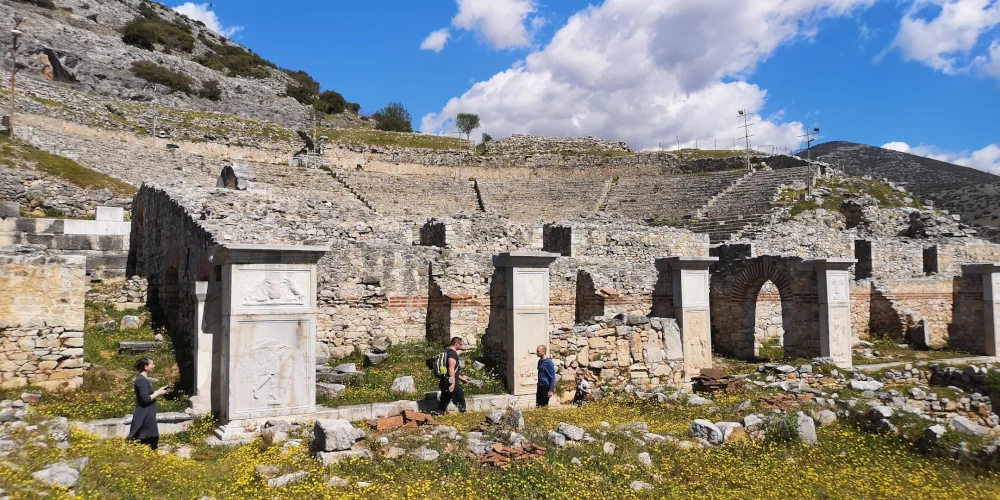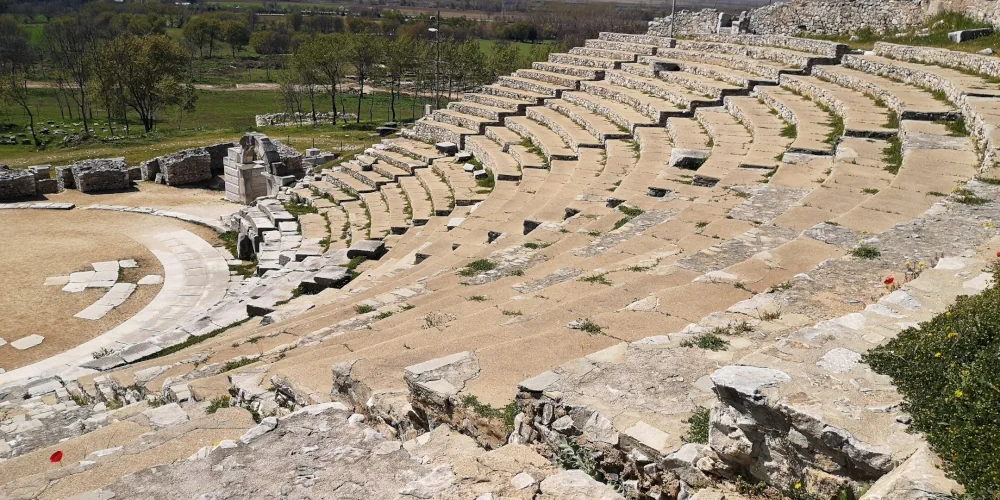Drama, a city in Northern Greece, is a destination rich in history, culture, and tradition. From archaeological discoveries and Byzantine landmarks to folklore museums and historical railways, Drama offers a fascinating journey into the past. Whether you’re a history enthusiast, an art lover, or a curious traveler, exploring Drama’s museums and historical sites is a must.
Archaeological Museum of Drama – A Window into the Past
📍 Location: Drama city center
The Archaeological Museum of Drama showcases artifacts from the Middle Paleolithic period to modern times, providing insight into the region’s ancient civilizations. The collection includes tools, pottery, jewelry, and relics from the Neolithic, Bronze Age, Classical, and Roman periods.
This museum highlights Drama’s evolution through the centuries, from its Thracian heritage to its importance in the Roman and Byzantine eras. A visit here offers a deep understanding of the region’s historical significance.
Folklore Museum of Drama – A Tribute to Greek Tradition
📍 Location: Operated by the Lyceum Club of Greek Women
For a glimpse into Drama’s cultural heritage, the Folklore Museum of Drama displays a rich collection of traditional Greek costumes, furniture, and everyday artifacts from past centuries.
Exhibits include handwoven textiles, local crafts, and household items, offering a unique perspective on the traditions and customs that have shaped Drama’s identity over the years. This is an ideal stop for those wanting to connect with local history and Greek folk traditions.
Hagia Sophia Church – A Byzantine Masterpiece
📍 Location: Drama city center
Dating back to the 10th century, the Hagia Sophia Church is one of Drama’s oldest and most significant Byzantine landmarks. With its well-preserved frescoes and historical architecture, this church is a must-visit for those interested in Byzantine art and history.
Inside, visitors can admire the original murals that depict religious scenes from centuries past. This site serves as a testament to Drama’s deep spiritual and cultural history.
Byzantine Fortress of Drama – A Glimpse into Medieval Greece
📍 Location: Drama city
The Byzantine Fortress of Drama stands as a reminder of the city’s medieval past, originally built to defend against invasions. The fortress offers panoramic views of the city and surrounding landscapes, making it a fantastic stop for history lovers and photographers.
Visitors can walk along ancient walls, explore remnants of medieval towers, and learn about Drama’s strategic role during the Byzantine and Ottoman periods.
Roman Baths of Drama – A Testament to Roman Ingenuity
📍 Location: Drama city
The Roman Baths of Drama showcase the advanced engineering and architectural skills of the Roman era. Featuring bathing pools, intricate mosaics, and heating systems, these ancient baths were not just places for hygiene, but also social hubs where politics and business were discussed.
Exploring this site offers a fascinating look at how Roman and Greek cultures intertwined, influencing daily life in ancient Drama.

Drama Railway Museum – A Journey Through Greece’s Rail History
📍 Location: Drama Railway Station
For train enthusiasts and history lovers, the Drama Railway Museum offers a unique glimpse into the history of Greece’s railway system. Established in 2007 by the “Hephaestus” Railway Employees and Friends Club, the museum is located next to Drama’s railway station.
The museum features beautifully preserved train carriages, historical railway artifacts, and a detailed exhibition on how the railway played a crucial role in the region’s development.
Visitors can explore restored locomotives, see railway equipment from different eras, and learn about the evolution of train travel in Greece. The entrance fee is 5 euros, contributing to the preservation of this historical site.
Archaeological Site of Philippi – A UNESCO World Heritage Monument
📍 Distance from Drama: Approximately 18 km southeast of Drama
Just a short drive from Drama, the Archaeological Site of Philippi is one of Greece’s most significant historical landmarks. Located near the modern village of Krinides, Philippi was founded in 356 BC by King Philip II of Macedon and went on to play a crucial role in various historical eras. From its development into a prosperous Roman colony, often referred to as “Little Rome”, to its pivotal role in early Christianity, Philippi is a city where history comes alive.
- Founding and Ancient History: Originally established by Thasian colonists and named Crenides, the city was renamed Philippi after its conquest by Philip II. Its strategic location along the Via Egnatia made it a crucial hub for commerce and military movements. Wikipedia
- Roman Era: The Battle of Philippi in 42 BC was a defining moment, leading to the city’s transformation into a Roman colony. This period saw the construction of significant infrastructures, including a forum and theater, reflecting its prosperity and importance. Wikipedia
- Early Christianity: Philippi holds a special place in Christian history as the site where the Apostle Paul established the first Christian community in Europe. The city’s ruins include early Christian basilicas that highlight its religious significance. whc.unesco.org

Visitors to Philippi can explore a range of well-preserved structures:
- Ancient Theater: Built during the reign of Philip II and later expanded by the Romans, this theater showcases impressive architecture and is still used for performances today.
- Roman Forum: The center of public life in ancient Philippi, the forum includes remnants of public buildings and marketplaces.
- Basilica B: An early Christian church with intricate mosaics and architectural details that offer insights into early Christian worship practices.
- Octagon Church: Believed to be dedicated to St. Paul, this unique eight-sided church reflects the city’s early Christian heritage.
Visiting Information
The Archaeological Site of Philippi is easily accessible from Drama, making it a perfect day trip for history enthusiasts. Guided tours are available, providing in-depth knowledge about the site’s rich past. The on-site museum houses numerous artifacts uncovered during excavations, offering a comprehensive understanding of the city’s historical context.
Exploring Philippi provides a unique opportunity to walk through the remnants of a city that significantly influenced the course of Western history.
Note: It’s advisable to check the official websites for the latest information on opening hours and any travel advisories before planning your visit.
Step Into Drama’s Rich History
Drama is more than just a beautiful Greek city—it’s a place where history comes to life. Whether you’re exploring ancient ruins, Byzantine churches, Roman baths, or railway heritage, Drama offers an unforgettable journey through time.
Plan your visit today and uncover the history that makes Drama a truly unique destination!

